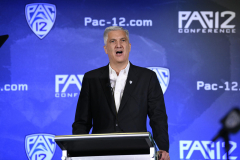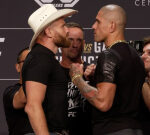You know by now that Colorado has voted to return to the Big 12 Conference, and that the Big 12 Conference has approved of the move. The Big 12 released a statement from Brett Yormark about Colorado. It didn’t have to say much, and it didn’t. Yormark, who has completely outmaneuvered George Kliavkoff and the Pac-12, very simply said this about the Buffaloes: “They’re back.”
It was the confident, minimalist statement of a man who knows he is cleaning the Pac-12’s clock.
Buy Trojans Tickets
It’s a mismatch. A wipeout. A rout.
We know how much the Pac-12 has embarrassed itself under Larry Scott. Now George Kliavkoff is being humiliated on the big stage. Meanwhile, the Pac-12 CEO Group continues to show a complete inability to manage situations, handle its commissioners, and steer negotiations toward successful conclusions. This happened under Scott, and it’s happening again.
You know the Pac-12 never misses an opportunity to step on a rake and embarrass itself, but you don’t know a number of details which make this latest debacle that much more remarkable and appalling.
With help from our friends at Buffaloes Wire — specifically this very informative and helpful article — we’ll unpack just how bad this latest Pac-12 embarrassment truly is.
It could be the embarrassment which leads to the extinction of the conference:

Dec 3, 2021; Las Vegas, NV, USA; Pac-12 commissioner George Kliavkoff speaks before the 2021 Pac-12 Championship Game between the Oregon Ducks and the Utah Utes at Allegiant Stadium. Mandatory Credit: Kirby Lee-USA TODAY Sports
We’ll refer to that Buffaloes Wire article shortly, but let’s start with this note at the 29: 50 mark of the linked video being shared here.
In the linked video, consultant Tony Altimore noted that George Kliavkoff (per his remarks last Friday, July 21, at Pac-12 media day) attended 30 Pac-12 board meetings in the past year. A normal year involves three board meetings.
Those 30 board meetings obviously failed to keep Colorado in the conference, failed to lead to a timely media rights deal, failed to create clear, effective messaging at Pac-12 media day, and potentially (we’ll see!) failed to keep the conference alive and functioning.
Big 12 fans and other college sports observers are saying one very obvious thing: The Pac-12 is all talk and no action. It’s really hard to argue against that. Meeting 30 times in a year and yet not getting a deal done — then watching Colorado bolt — is the kind of detail which makes you just shake your head and say, “That’s SOOOOO Pac-12.”
Yes it is. That alone is hugely embarrassing, but there’s so much more to unpack here.

Apr 1, 2023; Houston, TX, USA; San Diego State Aztecs forward Nathan Mensah (31) celebrates with fans in the stands after defeating the Florida Atlantic Owls in the semifinals of the Final Four of the 2023 NCAA Tournament at NRG Stadium. Mandatory Credit: Troy Taormina-USA TODAY Sports
We have to revisit the San Diego State situation. The Aztecs wrote a letter to the Mountain West on June 13 saying they intended to leave. It was out there in plain sight: San Diego State wanted to join the Pac-12. It was begging for the Pac-12 to step in, make a pitch, talk to ESPN and Amazon or Apple about media rights, get the grant of rights signed, and then invite SMU.
Boom. 12-team conference. San Diego and Dallas markets secured. More football and basketball inventory. Linear and digital deals delivered. If the price point wasn’t quite as much as the Big 12, so what? If it was reasonably close, that would have been enough to keep Colorado and form a 12-team league with stability for the long run.
We still don’t know the answer to this question: Just what was it which prevented the Pac-12 from acting to bring aboard SDSU, a school the Pac-12 has claimed it wanted and valued for all that sweet football inventory and extra TV cash?
Yes, the idea of having 10 schools — not 12 — split 2024 TV revenue could have given those 10 schools a larger cut of revenue to offset some lower budget projections connected to the Comcast overpayment scandal. That was an answer which narrowly made sense. However, it didn’t make enough sense that it was a better approach than getting SDSU and SMU aboard and finalizing a media rights deal by June 30. It shouldn’t have been a close call or a tough decision, and yet the Pac-12 was paralyzed, unwilling to act. It will remain a centrally baffling part of this saga.

Apr 1, 2023; Houston, TX, USA; San Diego State Aztecs guard Lamont Butler (5) celebrates with teammates after scoring the game-winning basket over Florida Atlantic Owls in the semifinals of the Final Four of the 2023 NCAA Tournament at NRG Stadium. Mandatory Credit: Robert Deutsch-USA TODAY Sports
Remember: If San Diego State left the Mountain West by June 30, it would have been on the hook for a $16.5 million exit penalty fee. The Pac-12 surely could have helped with that. TV money could have helped cover that cost. If SDSU left after June 30, it would have been on the hook for $34 million.
The Pac-12 had two and a half weeks — from the June 13 SDSU letter to the June 30 deadline — to line up the grant of rights, the media deal, and expansion. Keep in mind the Pac-12 had already been negotiating with media rights partners for months, and that its projections for a deal and a price point had included models with San Diego State and SMU.
Two and a half weeks should have been more than enough time for Kliavkoff to finalize a deal. Again: Why did this not happen? It hurts the brain trying to make sense of this.

Mar 12, 2020; Nashville, Tennessee, USA; Southeastern Conference commissioner Greg Sankey speaks on the cancelation of the SEC tournament at Bridgestone Arena. Mandatory Credit: Steve Roberts-USA TODAY Sports
SEC Commissioner Greg Sankey is an elite power broker in college sports. He leads the SEC, the most powerful conference. He has leverage. He can wait out opponents or competitors. He can be choosy. He doesn’t have to settle for the first offer he gets.
George Kliavkoff and the Pac-12 are not in that position. They are fighting for survival, not supremacy.
Pac-12 insiders claimed to feel no pressure to get a media rights deal, thinking their price point was going to be very good. The goal, though, was not to crush the Big 12. The goal was to keep the Pac-12 alive and unified. If the deal was a few million dollars lower than the Big 12, that wasn’t a problem. Three million dollars lower? Not a problem. Five million lower? Not a problem. Six? Not a problem. If it got to 12 million or more, yes, that would have been a problem, but anything inside seven or eight million — while not great — would have allowed the conference to survive for the next seven years, when it could then negotiate a new deal and perhaps regain its footing.
Survival, not supremacy. The Pac-12 was not in a position to be choosy. Yet, it sure seems as though it behaved that way. If it was delaying over a couple million dollars, that would be a tragic miscalculation … and moreover, a laughably incompetent one.

Oct 13, 2021; San Francisco, CA, USA; Pac-12 commissioner George Kliavkoff addresses name, image, likeness, protocols during Pac-12 men’s basketball media day. Mandatory Credit: Kelley L Cox-USA TODAY Sports
One thing a lot of people might not have appreciated about Pac-12 media day, relative to SEC media days or Big Ten media days, is that the Pac-12 has a one-day media event. The other Power Five conferences have multiple-day media events.
When a conference has a multi-day media event, it can spend the first day(s) talking about football and then reveal a media deal on the final day of the event. Athletic directors and presidents can be absent on the first day, but they need to show up on the last day of a multi-day event.
The Pac-12 has a one-day media event. The Pac-12 had only one day to present its message and tell member schools about the progress of a media deal.
Kliavkoff backing away from a bold assurance about the completion of a media deal, and Colorado AD Rick George storming out of the event to catch a flight, both struck us here at Trojans Wire as ominous signs. That story (Rick George bolting out of Pac-12 media day to go to the airport) didn’t strike a lot of other people as a big deal. We thought it was a big deal.
It turned out it was a bigger deal than anyone (including us) imagined. The dynamics of a one-day media event were — and are — significantly different from a multi-day media event. The Pac-12 did not grasp the importance of that reality.
It could cause the conference to die.

Jul 27, 2021; Hollywood, CA, USA; PAC-12 commissioner George Kliavkoff speaks to the media during the Pac-12 football Media Day at the W Hollywood. Mandatory Credit: Kelvin Kuo-USA TODAY Sports
The Pac-12’s insistence that an extended, prolonged negotiation process was good, not bad, was always bizarre … and it turned out to be wrong.
When a negotiation continues, a snag or plot twist can scuttle a potential deal. As long as a negotiation remains unresolved, one or two parties can balk. They get nervous. They get restless. Sealing the deal is always the best negotiation approach.
The Pac-12 waited and waited. Colorado finally had enough of waiting. It’s another severe misread of the room. The idea that time was not of the essence was — and always will be — absolute insanity on the part of the Pac-12.

Sep 18, 2021; Boulder, Colorado, USA; PAC-12 commissioner George Kliavkoff before the game between the Minnesota Golden Gophers against the Colorado Buffaloes at Folsom Field. Mandatory Credit: Ron Chenoy-USA TODAY Sports
Here’s where we bring in that Buffaloes Wire article we mentioned above. The Pac-12 just kept delaying and pushing back the timeline. This pattern repeated itself so continuously that Colorado finally ran out of patience.
From Buffaloes Wire:
Here’s what Colorado AD Rick George and chancellor Phil DiStefano said regarding the Pac-12 losing USC and UCLA:
“The announcement of USC and UCLA joining the Big Ten came as a disappointment to all of us at CU Boulder. Despite this news, we remain resolute in our commitment to our student-athletes and will continue to provide them the resources for success both in the classroom and on the fields of competition.
“We have been in constant communication with our fellow universities as well as conference leadership and will continue to work closely as this dynamic situation continues to develop. CU Boulder is a world-class academic institution with elite athletic programs and will continue to be a leading voice in the changing college athletics landscape.”

Nov 19, 2016; Boulder, CO, USA; Colorado Buffaloes athletic director Rick George before the game against the Washington State Cougars at Folsom





